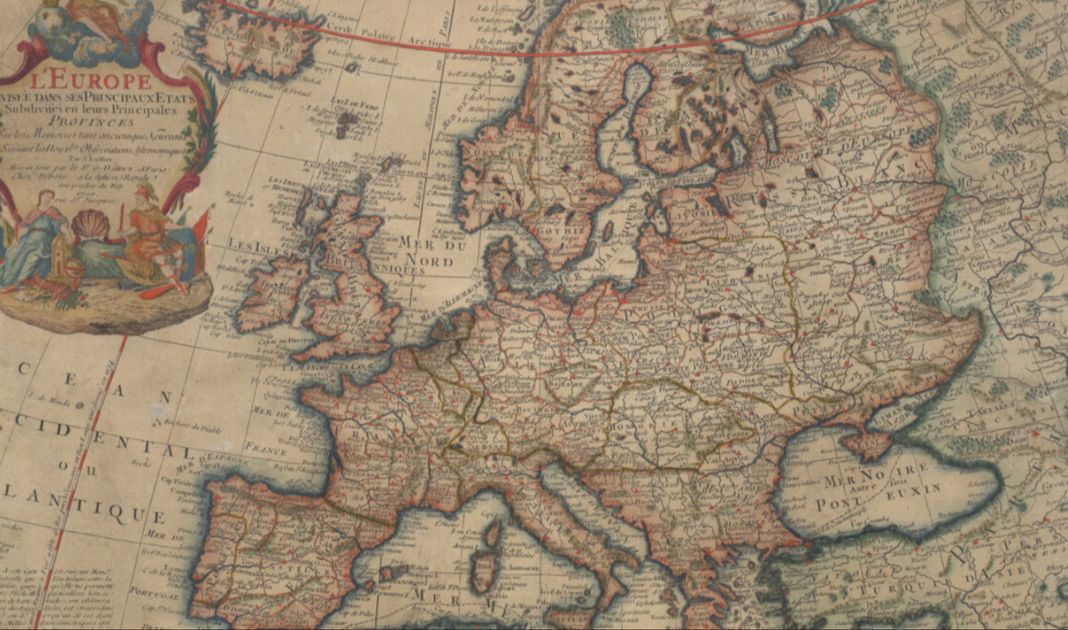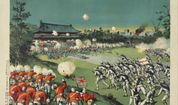Intermarium Weekly 6-12.05.2020

(goodfon.ru)
Poland
Polish President Andrzej Duda approved a new National Security Strategy on Tuesday, which designated the Russian policy – described as “neoimperial” as the main threat to the republic. The signing ceremony took place in the presidential palace and was broadcast by Polish television. According to the document, “The most serious threat is the policy of the authorities of the Russian Federation, which is implemented using military force” – stated in the text of the document, formative in so far as defense and security is concerned. The main response to this threat, according to the strategy, should be to strengthen ties with the European Union and NATO and bring the level of defense spending in the country to 2.5% of GDP by 2024. In addition to external threats and cooperation with allies, the strategy describes foreign policy tasks against the backdrop of modern threats arising from the development of the Internet and electronic data transfer. It is emphasized that the development of new solutions based on fixed-line and mobile broadband networks (5G and later generations), quantum technologies, service automation, nanotechnology and artificial intelligence creates new opportunities for development in Poland, while creating previously unknown threats. The document also underscores the need to capitalize on Poland’s pivotal geographic location, and foster the North-South commercial links. Last but not least, National Security Strategy also identifies the need to develop indigenous and independent situational awareness capabilities, including satellite surveillance, as well as long range artillery and corresponding guidance systems.
What Russia and Belarus have apparently found particularly unnerving was the news that the Polish Armed Forces intend to purchase more than a hundred trucks with trailers for transporting tanks and other armored vehicles. We are talking about the tender announced by the Polish Ministry of National Defense for the purchase of 31 tractors with the option of subsequent purchase of another 78 pieces of equipment.
Romania
The Hungarian-Romanian dispute over the Transylvania is continuing. Hungarian PM Viktor Orban has posted a photo with the Great Hungary’s map, which also included Transylvania. The photo has been posted as Hungarian high school students are taking history exams. Viktor Orban’s post comes one week after the Bucharest-Budapest row on the Szeklerland’s autonomy bill debated in the Romanian Parliament. The draft law was rejected by the Senate after having been tacitly adopted by the Chamber of Deputies. Romanian President Klaus Iohannis took a harsh stance on it, accusing PSD of intending” to give Transylvania to Hungarians”. Orban said in retort that he had never heard such statements in Romania, not even “in the most tumultuous anti-democratic times“.
Romania is ready to send its citizens to the seasonal works in Austria. The Romanian Government put conditions for such cooperation with Vienna that all required measures against the COVID-19 must be taken into account. Thus, the first trains specially ordered by the Austrian authorities for the transport of Romanian workers to and from Austria would run from the end of this week. Two pairs of trains are being prepared on the routes Vienna-Timisoara and Timisoara-Vienna.
The Baltic States
The Baltic States, particularly Lithuania, continue their struggle against the nuclear plant in Belarus. After Belarus announced that nuclear fuel has been delivered to its new Astravyets nuclear power plant, Lithuania has called on Minsk not to load it into power productions facilities before international safety recommendations have been met. The security matters are of utmost importance, because the future plant is very close to the Lithuanian border and to its capital.
The Eastern European members continue joint policy regarding the Russian Federation. For example, the Estonian President stated that her country does not intend to buy electricity from Russia. However, Estonia is a member of the Nord Pool (regional electric system) power exchange. Nevertheless, Russia, Belarus, and all Baltic States are members of the post-Soviet BRELL ring. The main strategic aim of Estonia in this sphere is to disconnect its grid from old Soviet system and to synchronize it with the Continental European system. Furthermore, Estonia supports the European Commission’s initiatives to tax electricity imports from the third countries in a bid to protect the single market from dumping. The issue of Russian electricity divides the Baltic States, Lithuania calls for joint policy against Russian electricity (Astravyets nuclear power plant), but for example Latvia is avoiding such initiative. This week it has been stated that she is “considering” the necessity to join to the Lithuanian initiative.
If in case of economic cooperation with Russia the countries are divided, they demonstrate unity regarding the political and historical issuesThis week the presidents of Baltic States (together with U.S. and other CEE countries) condemned Russia’s attempts to falsify history by playing down Moscow’s role in “unleashing” the Second World War and Soviet crimes in occupied Baltic countries. On the eve of the 75th anniversary of the end of WW2, the leaders of the Baltic countries issued a joint statement warning that distorting history posed a threat to the rules-based global order. In the same way, these countries called to the EU to establish the EU Recovery Fund and to adjust the bloc’s multi-annual budget to tackle the impact of the coronavirus in Europe.
Military activities were restored this week. The Estonian Defense Forces despite the emergency situation have launched military exercises. More than a thousand soldiers are taking part in Spring Storm’s live firing exercises.
Moreover, the Lithuania’s Navy is gearing up for the acquisition of a used HUNT-class mine hunting, search and rescue vessel from the United Kingdom, according to the Lithuanian Defense Ministry. The total value of the ship’s acquisition and upgrade will stand at around 62.4 million euros, including taxes. The price includes the vessel’s complete preparation for mine hunting, search and rescue tasks, as well as a package of spare parts, warranty maintenance, personnel training for the servicing and operation of the new equipment.
Ukraine
Ukraine hopes to compensate the economic losses stemming from the COVID-19 pandemic through international assistance. Kiev is going to receive $150 million loan from the World Bank, and hopes to receive financial help from the EBRD and the EIB for infrastructural projects with budget around one billion dollars. These include further reconstruction of the M05 Kiev – Odessa road to Odessa and the construction of the northern Lviv bypass road. President Vladimir Zelensky found an alternative way to appoint the former President of Georgia Micheil Saakaszwili the Head of the Reform Executive Committee. Saakashvili’s appointment triggered a discussion inside Ukraine about the future stability of political system of the country. Moreover, the Georgian Government immediately reacted to this controversial appointment, by recalling its ambassador in Kiev for consultations. This is bad news because Kiev’s move can distort the relations between the main allies in the region. Definitely, it is not going to undermine NATO, the EU and U.S. previous efforts immediately, yet it can at least undermine the existing “united front” of countries suffering from Russian aggression. The Georgian MFA does not consider breaking diplomatic relations or revising strategic partnership but recognizes the fact of deterioration of relations between two countries.
The Ukranian SE “Ivchenko-Progress” has delivered 12 AI-450 engines to Turkish “Akinci” drone. The second prototype of the Akinci strike UAV, which is due to take place in the near future, is being prepared for the first flight. In February 2020, Zaporizhzhya Motor Design Bureau “Progress” designed them. Thus, the total number of engines of this type delivered to Turkey reached 12: 6 were exported in 2019 and 4 in 2018. For last decades Ukraine helped China with precious technologies and now Kiev is doing same with Turkey. It is quite interesting that neither U.S., nor EU never shared with Ankara such technologies.
Onur Taahhut Tasimacilik Insaat Ticaret ve Sanayi A.S. won a tender for construction of the M-12 Stry-Ternopil-Vinnitsa-Kropyvnytsky-Znamenka road. Updating the M-12 is one of Ukravtodor’s priorities, as it is a part of the Go Highway transport corridor that will connect the Ukrainian Black Sea ports of Nikolayev and Odessa with the Polish port of Gdansk on the Baltic Sea. In addition, the road is of exceptional importance for communication between regional centers within the country. The previous contract for reconstruction and overhaul on the M-12 highway was signed on October 10, 2017 with Xinjiang Communications Construction Group Co. Ltd. (China). The contract value amounted to 38.49 million dollars; the term of the work was 540 days. The expected deadline was set for fall 2019. On June 3, 2019, Ukravtodor terminated the contract with Xinjiang Communications Construction Group Co Ltd (China). According to Ukravtodor, at the time of termination of the contract, the contractor performed only certain types of work, which amounted to less than 1% of the total work. At the same time, by now, the contractor should have completed 70% of the work.
Regarding foreign investments in Ukraine, Kiev considers adding new specific amendments into the Ukrainian law, making it more stringent. The Ministry of Economic Development, Trade and Agriculture proposed to oblige non-residents to obtain permits for investments in strategic enterprises from the Interdepartmental Commission that would assess the impact of foreign investment on national security. The key word here is national interests and for Ukraine the western investments are not “a threat”. Hence, it is possible to anticipate that these proposed amendments are directed against Chinese and Russian enterprises. The most prominent case is “Motor Sich”, which has an extensive history of attempted takeovers. In case of adoption of the amendments, the granting the permission by the Antimonopoly Committee of Ukraine for acquisition of an enterprise of strategic importance will be subject to approval of the transaction by the specified commission.
In the foreign markets Ukraine gained one additional point. On the Czech electronic procurement portal, the Czech-Ukrainian consortium offered more competitive prices. At the same time, Skoda Electric, which participated in the tender, offered a price of EUR3.04 million for a trolleybus. Trolleybuses based on the Bogdan T701 should be adapted to the needs of the Czech market, in particular, electrical equipment for them should be supplied by the Czech company Cegelec. Moreover, Ukrainian oligarch Rinat Ahmetov is showing interest in taking Polish bankrupt metallurgical plant in Czestochowa (“ISD Huta Czestochowa”). The main competitor of Ukrainian oligarch is “Sunningwell International Polska”, a Chinese holding.
The main delivery Ukrainian postal services provider “Nova Poshta Global” has tested delivery of packages from AliExpress to Ukraine by cars. A truck with carrying 7467 packages ordered on AliExpress by Ukrainian customers left the Chinese city of Urumqi and covered a distance of almost 6,000 km. The package route passed through Poland, from where they were delivered by truck to the sorting station in Kiev on May 12. The test dispatch showed that it was possible to meet the planned delivery time by truck. On the whole, the journey from Urumqi to Warsaw took 6 days and another two days to Kiev. The company will be able to deliver packages in three ways: by plane, by train and by car.
Interestingly, this week the representative of the EBRD has stated that the post-COVID crisis can bring to Ukraine huge opportunities especially in term of becoming a part of the new supply chains in Eurasia.
The battle for Ukrainian workforce is continuing in the European Union. Finland alone needs about 15 thousand Ukrainian seasonal workers this year. Ukrainian seasonal labour is also in high demand in Austria, Great Britain, Poland, Czech Republic. The Ukrainian President listed conditions for the EU countries including a demand, that Ukrainian workers are provided with contracts for a minimum of three months. This could generate problems, however – for example, the Estonian company “Frigohans OÜ”, which provides international freight transport, is concerned that the state may not extend the work permits for Ukrainian and Belarusian drivers. Regarding the relations with the EU, Ukraine hopes to renegotiate an additional concession from Brussels within the DCFTA because Kiev reached the maximum in the export-quotes to the EU. This fact deeply irritated the COPA – European agricultural union which is against the renegotiations.
As a way of standardization of its military sector to the NATO standards, Ukraine has increased procurements from the NATO members this year. For example, Kiev is buying Montenegro-made UT M68P1 fuses and M-80 mine charges (their use is allowed in Donbas according to Minsk Agreements). An important element in maintaining the combat readiness of the Armed Forces continues to be the export of certain items of the ammunition nomenclature. Again, while there is no full information in the public domain, it has recently been revealed, that in December 2019 “Ukroboronservis” and the State Self-supporting Foreign Trade and Investment “Ukrinmash” company imported through Polish companies 2 million idle cartridges of 7.62×54 mm caliber and 150 thousand combats 5.56×45 mm caliber made in Bulgaria.
Belarus
Thousands upon thousands of people participated in the Victory Day celebrations in Belarus, in spite of the raging pandemic. Because of this, the Baltic States now consider Belarus to be a regional hotspot of the disease. However, Alexander Lukashenka is demonstrating amazing stubbornness and is deeply convinced that his way of managing COVID-19 situation is right, saying Minsk reaction to the novel coronavirus cannot be classified as “bravado”. Moreover, he used the Victory Parade as a pretext to poke Russia for her decision to terminate the Moscow parade. It should be noted that the Belarusian Parliament has approved the official date of upcoming elections – they will be held on 9th of August.
Foreign Ministers of Belarus Vladimir Makei and of Poland Jacek Czaputovicz had a telephone conversation. The parties discussed a bilateral cooperation, including ways to increase trade and economic cooperation between the two countries and diversify energy supplies. Also, they emphasized the importance of the development and improving of the Eastern Partnership (EaP). Belarus recalled its proposal to hold a high-level EaP event in Minsk in order to discuss promising areas for implementing this initiative after 2020. It is a serious move towards granting Belarus greater degree of geopolitical flexibility around it’s neighbourhood, which now is seemingly becoming a part of Lukashenko’s grand strategy. In practical terms this could mean achieving energy independence. Together with Poland, the country is continuing negotiations concerning shipments of hydrocarbons. For example, Belarus has completed two directions of supplies – southern (Ukraine) and northern (Baltic States). Now they are working with Poland over developing the western direction of oil and gas deliveries to the country via Poland (Gdansk). In a similar vein, the first shipment of oil bought from the Saudi Arabian national oil company Saudi Aramco – 80,000 tonnes –reached the Klaipeda port.
China has finally responded to Lukashenka’s complaints that the “Great Stone” industrial park has so far fallen short of its promise of reinvigorating commercial links between the two countries.
Cornerstone laying ceremony took place last week in the Sinomach Industrial Park. The Park will include office spaces, research facilities, as well as supporting infrastructure. Zhongguancun Technopark and the National Academy of Sciences of Belarus will be involved in the construction and operation of the site.
Autor
Ridvan Bari Urcosta
Senior Analyst at Strategy&Future






Trwa ładowanie...